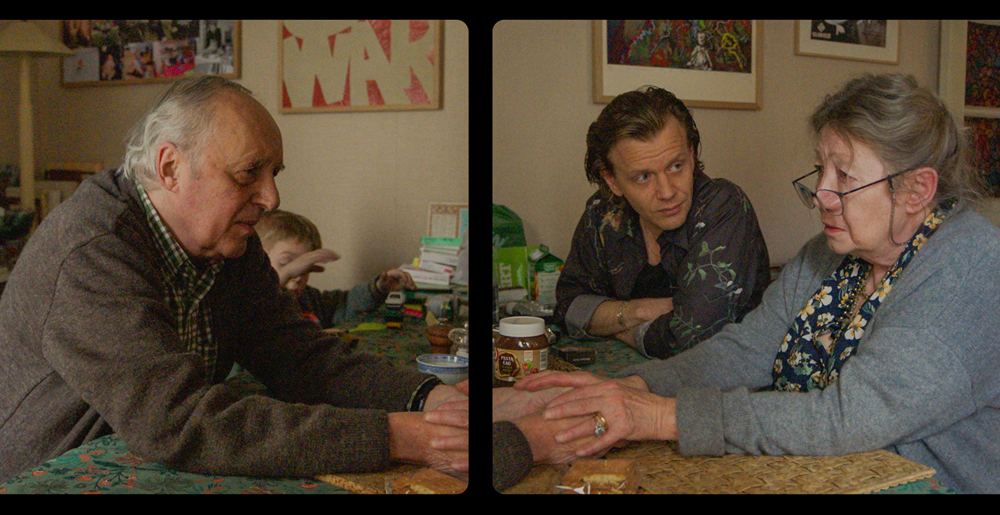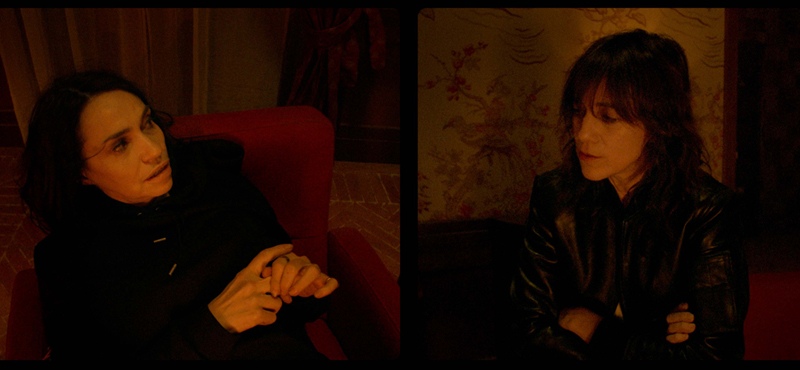One of my most cherished memories of the Toronto Film Festival happened in 2015 when “Evolution” premiered at the Ryerson at midnight and its director Lucile Hadzihalilovic couldn’t attend for reasons I can no longer remember. She was bound to get a rapturous ovation when the film had been her first feature in 11 years, a follow-up to the spellbinding “Innocence” and although TIFF is strict about enforcing a no cell phone policy, no one was going to stop her partner Gaspar Noe from pulling out his iPhone in the back of the house to record the audience reaction to the first five to ten minutes of the film, presumably to ensure Hadzihalilovic had a chance to experience it.
The kindness of this gesture has always counterbalanced in my mind the image that has long been out there of Noe as a cinematic madman, someone who always can be counted on to open his heart on screen though it often looks more like a gruesome surgery. This particular memory made me smile as I watched the “Enter the Void” director’s double feature of “Lux Aeterna” and “Vortex,” entering the U.S. in pieces thanks to different distributors, yet are made whole but his singular vision. Made two years apart, they not only were shot on different sides of a global pandemic, but the director’s own personal health woes, a sudden brain hemorrhage that had him contemplating his own mortality after miraculously escaping with his faculties intact. Yet when watched now in tandem, the films don’t seem to exist as before and after, but on one wavelength that feel as if they’re his most personal to date, requiring him to step into others’ perspective in order to process his own emotions.
A longtime fan of split screen, there’s poetry in how one can read Noe’s experience as adjacent to the subjects in “Lux Aeterna” and “Vortex,” with the former his earlier film from 2019 a consideration of filmmaking from the point of view of a pair of actresses who go by their own names in Beatrice Dalle and Charlotte Gainsbourg. Only after some chitchat between the two by a fireplace that’s revealed to be a set does “Lux Aeterna” reveal itself as a work of fiction as you might think Dalle is reminiscing about a nude scene she once had to film, describing to Charlotte the mortifying feeling of standing in front of a crew of hundreds without cover, something that no doubt the actress who became a star from Jean-Jacques Beineix’s sultry drama had no trouble imagining. She, in fact, is not acting in “Lux Aeterna” – or at least, involved in the making of “God’s Craft,” the film within Noe’s film, as an actress, but instead serving as its director, which is no less anxiety-inducing as she deals with a frustrated producer, a director of photography with his own ideas and a truly hellish set-piece involving Charlotte being burned at the stake for being presumed a witch.
While Beatrice makes time and space for Charlotte, knowing how much it takes simply to show up on set let alone perform, the pressure on both is relentless and intense, with Noe and longtime cinematographer Benoit Debie imagining the production as a maze to navigate with some of the darkest corners imaginable – to duck the various people on set eager to get her attention, it doesn’t seem coincidental that Charlotte tucks into a neighboring set that’s a morgue for a quiet phone call with her daughter. “Lux Aeterna” may boast the most chilling – and accurate evocation – of the chaos and competing agendas of a film set since “Living in Oblivion,” with a behind-the-scenes documentarian roving around like a predator, an aspiring director that’s a guest of some rando with crew access aiming to get his script into the hands of Charlotte and an Australian actress (Abbey Lee) who doesn’t understand a lick of French and finds herself unable to protest the film’s topless scenes that weren’t in her contract. As Noe peppers the film with quotes from Jean-Luc Godard and Rainer Werner Fassbender positioning the director on high, he is simultaneously tearing down any notion of them as a trustworthy authority as you see the toll it takes on Beatrice and Charlotte, although as Beatrice concludes of that first time literally being undressed before a set, “It was a good film, so who cares?”
If Noe came to question the demands he has made of others as a filmmaker in “Lux Aeterna,” “Vortex” offers an opportunity to consider what responsibilities he’ll have in old age, slipping into a modest Parisian flat with Lui (Dario Argento) and Elle (Françoise Lebrun), who have only each other and the occasional visit from their son Stéphane (Alex Lutz) for support in their golden years. If Dalle was canny casting in “Lux Aeterna,” given her professional history, the baggage Argento carries into playing Lui, a quiet film academic with something inexplicably murky roiling around underneath, enlivens the proceedings substantially as you think where the mind of the director of “Tenebrae” and “Suspiria” could go as he has to keep tabs on Elle, who will wander off without a trace and is unable to remember who her husband is at times.
Dividing Lui and Elle’s experience into separate frames, the loneliness of old age and the different reactions to it is able to settle in full as the merciless creep towards death is relentless, but Noe envisions the worst to show that it isn’t a solitary struggle at all, at least in terms of any additional shame that’s felt by anyone going through it when the psychological and physical deterioration is exhibited in such mundane and common situations. Like “Lux Aeterna,” a bodega becomes an impenetrable labyrinth for Elle to find her footing in and a return to the apartment is laced with hazards from a boiling tea kettle to important documents threatened with being misplaced and never to resurface. It’s no accident that their son Stéphane is bedeviled by his own impulses as a drug addict, reformed to the point he attempts to help others by providing clean needles at a street clinic, and there for his parents as much as he can be, yet only able to do so much. Although the limits of the frame make themselves known as the parameters for how much one can help someone else, the breakthrough is in letting the experiences live side by side with equanimity and no judgments made, simply allowing you to walk in another’s shoes as only a master filmmaker can.
“Vortex” is now playing in New York and opens nationwide on May 6th. You can find your local theater playing it here. “Lux Æterna” opens on May 6th at the Metrograph in New York and begins a nationwide run on May 12th. A full list of theaters and dates is here.





